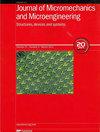Mass transfer characteristics at cathode/electrolyte interface during electrodeposition of nickel microcolumns with various aspect ratios
IF 2.1
4区 工程技术
Q2 ENGINEERING, ELECTRICAL & ELECTRONIC
引用次数: 0
Abstract
The filling behavior of electrodeposited microcolumns is strongly influenced by the mass transfer characteristics at the cathode/electrolyte interface. This study aims to elucidate the influence of the mass transfer characteristics (ion supplementation via diffusion and ion consumption via deposition) on the electrodeposition of microcolumns, thus providing feasible solutions for improving void defects with different feature sizes. The results indicate that ion consumption plays an important role in the mass transfer within large-width microcavities (100 μm). For large-width microcolumns, longer electroforming times lead to higher ion consumption, resulting in nonuniform ion concentration distribution, and consequently uneven deposition rates along the microcavity wall. In microcavities with high aspect ratio (5:1), ion supplementation plays a major role. The low ion supplementation rate does not support a uniform deposition, resulting in a large void defect and a low filling ratio in the deposited microcolumns. Therefore, reducing the ion consumption rate by decreasing the current density from 1 A dm−2 to 0.25 A dm−2 can effectively increase the filling ratio in large-width microcolumns with no significant effect on high aspect ratio microcolumns. On the contrary, the pulse reverse current (forward pulse current density 1 A dm−2, reverse pulse current density 2 A dm−2, frequency 1 Hz, forward pulse duty cycle 0.9) can increase the filling ratio in the high aspect ratio microcolumns by accelerating ion supplementation through dissolution of the deposited layer. By further increasing the reverse pulse current density from 2 A dm−2 to 6 A dm−2, void defects can be completely eliminated and even void-free deposition of high aspect ratio microcolumns (5:1) can be achieved.不同宽高比镍微柱电沉积过程中阴极/电解质界面传质特性
电沉积微柱的填充行为受到阴极/电解质界面传质特性的强烈影响。本研究旨在阐明传质特性(通过扩散补充离子和通过沉积消耗离子)对微柱电沉积的影响,从而为改善不同特征尺寸的孔隙缺陷提供可行的解决方案。结果表明,离子消耗在大宽度微腔(100μm)内的传质过程中起着重要作用。对于大宽度的微柱,较长的电铸时间会导致较高的离子消耗,导致离子浓度分布不均匀,从而导致沿微腔壁的沉积速率不均匀。在高纵横比(5:1)的微腔中,离子补充起着主要作用。低离子补充率不支持均匀沉积,导致沉积的微柱中存在大的空隙缺陷和低填充率。因此,通过将电流密度从1A dm−2降低到0.25 A dm−2来降低离子消耗率,可以有效地提高大宽度微柱的填充率,而对高纵横比微柱没有显著影响。相反,脉冲反向电流(正向脉冲电流密度1 A dm−2,反向脉冲电流密度2 A dm−2中,频率1 Hz,正向脉冲占空比0.9)可以通过溶解沉积层加速离子补充来增加高纵横比微柱中的填充率。通过进一步将反向脉冲电流密度从2 A dm−2增加到6 A dm−2中,可以完全消除空隙缺陷,甚至可以实现高纵横比微柱(5:1)的无空隙沉积。
本文章由计算机程序翻译,如有差异,请以英文原文为准。
求助全文
约1分钟内获得全文
求助全文
来源期刊

Journal of Micromechanics and Microengineering
工程技术-材料科学:综合
CiteScore
4.50
自引率
4.30%
发文量
136
审稿时长
2.8 months
期刊介绍:
Journal of Micromechanics and Microengineering (JMM) primarily covers experimental work, however relevant modelling papers are considered where supported by experimental data.
The journal is focussed on all aspects of:
-nano- and micro- mechanical systems
-nano- and micro- electomechanical systems
-nano- and micro- electrical and mechatronic systems
-nano- and micro- engineering
-nano- and micro- scale science
Please note that we do not publish materials papers with no obvious application or link to nano- or micro-engineering.
Below are some examples of the topics that are included within the scope of the journal:
-MEMS and NEMS:
Including sensors, optical MEMS/NEMS, RF MEMS/NEMS, etc.
-Fabrication techniques and manufacturing:
Including micromachining, etching, lithography, deposition, patterning, self-assembly, 3d printing, inkjet printing.
-Packaging and Integration technologies.
-Materials, testing, and reliability.
-Micro- and nano-fluidics:
Including optofluidics, acoustofluidics, droplets, microreactors, organ-on-a-chip.
-Lab-on-a-chip and micro- and nano-total analysis systems.
-Biomedical systems and devices:
Including bio MEMS, biosensors, assays, organ-on-a-chip, drug delivery, cells, biointerfaces.
-Energy and power:
Including power MEMS/NEMS, energy harvesters, actuators, microbatteries.
-Electronics:
Including flexible electronics, wearable electronics, interface electronics.
-Optical systems.
-Robotics.
 求助内容:
求助内容: 应助结果提醒方式:
应助结果提醒方式:


